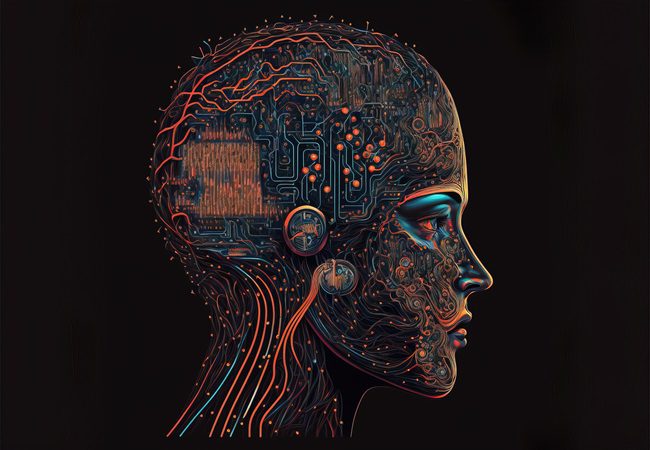Introduction:
In the relentless march of technological progress, Artificial Intelligence (AI) has emerged as a transformative force, reshaping industries and redefining the very essence of work. This article delves into the profound changes AI is bringing, transitioning industries from mere automation to true innovation. We’ll explore how businesses across sectors are leveraging AI to streamline processes, enhance efficiency, and pave the way for unprecedented innovation.
The Evolution of Automation:
Automation, the precursor to the AI revolution, marked a significant leap in improving efficiency and reducing human intervention in various tasks. Industries embraced automated processes to handle repetitive and labor-intensive activities, leading to increased productivity. However, the evolution of technology has propelled us beyond mere automation, setting the stage for the integration of AI into the heart of industries.
The Role of Artificial Intelligence:
Artificial Intelligence, equipped with advanced algorithms and machine learning capabilities, is taking automation to new heights. Unlike traditional automation, AI systems can learn, adapt, and make intelligent decisions based on data analysis. This shift from rule-based automation to cognitive automation signifies a paradigmatic transformation in the way industries operate.
Streamlining Operations:
One of the primary impacts of AI on industries is the streamlining of operations. AI-driven systems can analyze vast datasets in real-time, identify patterns, and optimize processes with a level of precision and speed beyond human capability. From supply chain management to customer service, AI streamlines operations, reducing costs and enhancing overall efficiency.
Enhancing Decision-Making:
AI’s analytical prowess extends to decision-making, offering insights derived from complex datasets. Businesses can make data-driven decisions, informed by AI-generated predictions and trend analyses. This not only minimizes the margin for error but also enables industries to proactively respond to market changes and stay ahead of the competition.
Improving Customer Experiences:
The integration of AI is revolutionizing how industries interact with customers. Chatbots powered by AI provide instantaneous responses, virtual assistants offer personalized recommendations, and predictive analytics anticipate customer needs. These innovations contribute to elevated customer experiences, fostering loyalty and satisfaction.
Transitions in Workforce Dynamics:
As industries evolve with AI integration, there are noticeable transitions in workforce dynamics. The focus shifts from routine tasks to roles that require creativity, critical thinking, and emotional intelligence—attributes that distinguish human capabilities from artificial ones. AI becomes a tool to augment human potential rather than replace it.
Words of Transition:
As we navigate the transformative journey from automation to innovation, it’s essential to delve into the specific industries experiencing profound changes and explore the nuanced ways AI is leaving its mark.
AI in Manufacturing:
In the manufacturing sector, AI-driven automation is optimizing production processes. Predictive maintenance powered by AI analyzes equipment data to anticipate potential breakdowns, minimizing downtime and reducing maintenance costs. Robotics equipped with AI capabilities enhance precision in manufacturing, contributing to higher-quality outputs.
AI in Healthcare:
In healthcare, AI is revolutionizing diagnostics, treatment plans, and patient care. Machine learning algorithms can analyze medical records, images, and genetic data to assist in disease detection and treatment customization. This not only expedites healthcare processes but also leads to more accurate diagnoses and personalized treatment options.
AI in Finance:
The financial industry is witnessing a seismic shift with AI transforming traditional banking and investment practices. AI algorithms analyze market trends, predict investment outcomes, and automate trading processes. Chatbots provide instant customer support, and AI-driven risk assessments enhance the accuracy of financial decision-making.
AI in Retail:
The retail sector is undergoing a renaissance with AI redefining the shopping experience. Recommendation engines analyze customer preferences, chatbots assist in product inquiries, and facial recognition technology streamlines checkout processes. AI-driven inventory management ensures optimal stock levels, minimizing both overstock and understock situations.
AI in Education:
In education, AI is revolutionizing learning experiences. Adaptive learning platforms use AI to customize educational content based on individual student needs. Virtual tutors powered by AI provide real-time feedback, and predictive analytics help educators identify students who may need additional support.
Overcoming Challenges and Ethical Considerations:
While the benefits of AI integration are evident, it’s crucial to address the challenges and ethical considerations that come with this technological evolution.
Ensuring Data Privacy:
The increased reliance on AI involves the collection and analysis of vast amounts of data. Ensuring the privacy and security of this data is paramount. Industries must implement robust cybersecurity measures and adhere to stringent data protection regulations to safeguard sensitive information.
Mitigating Bias in Algorithms:
AI algorithms are only as unbiased as the data they are trained on. Addressing biases in algorithms is a crucial step to ensure fair and equitable outcomes. Continuous monitoring and ethical AI practices are essential to mitigate biases and promote transparency.
Transparency in Decision-Making:
The opacity of AI decision-making processes poses challenges, especially when the outcomes impact individuals’ lives. Industries must prioritize transparency in how AI algorithms reach conclusions, ensuring that decisions are understandable and justifiable.
Educating the Workforce:
The evolving nature of industries due to AI necessitates upskilling and reskilling the workforce. Businesses should invest in educational programs to equip employees with the skills required to collaborate effectively with AI systems and assume roles that demand human attributes such as creativity and emotional intelligence.
Collaboration for Innovation:
In navigating the transition from automation to innovation, collaboration is key. Industries, policymakers, and technology developers must work together to create ethical frameworks, standards, and regulations that guide the responsible integration of AI. Open dialogue and collaboration ensure that the benefits of AI are maximized while potential risks are mitigated.
The Future Landscape:
As we delve into the transformative impact of AI on industries, the future landscape unfolds with endless possibilities. Furthermore, from predictive analytics shaping business strategies to personalized healthcare solutions and interactive learning experiences, AI is not just a technological advancement; it is poised to be the driving force behind a new era of innovation.
Conclusion:
The transition from automation to innovation, fueled by the integration of Artificial Intelligence, marks a monumental shift in how industries operate. As businesses embrace AI, they not only enhance efficiency and streamline operations but also unlock unprecedented possibilities for innovation and growth. However, responsible AI adoption is crucial, with a focus on mitigating challenges, addressing ethical considerations, and fostering collaboration. In navigating this transformative journey, industries stand at the threshold of a new era—one where innovation is not just a buzzword but a tangible reality reshaping the future of work and industries alike.

































